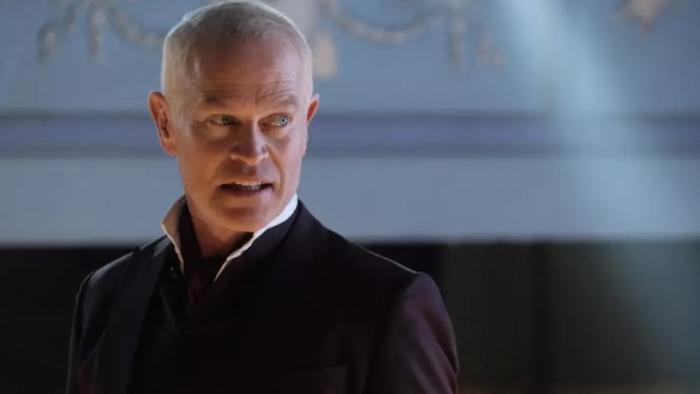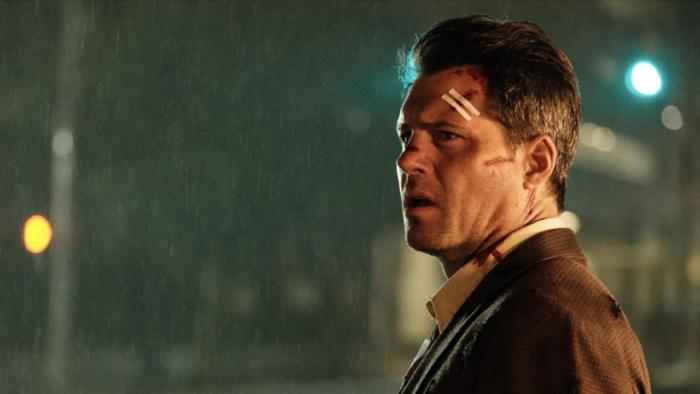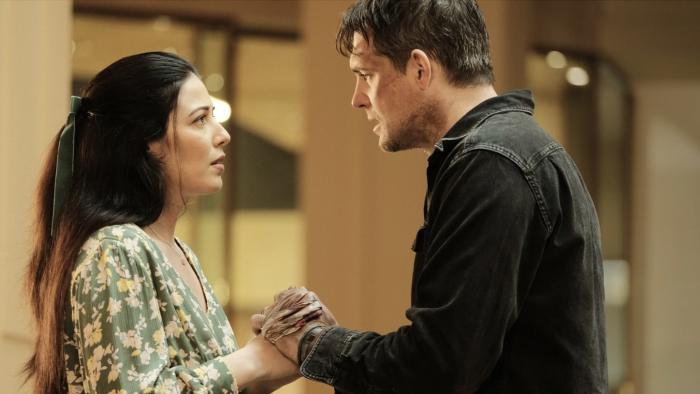Review THE SHIFT
THE SHIFT is a 2023 film written and directed by Brock Heasley that combines Christian themes in a science fiction dystopian multiverse setting.
It is a triumph and a wonder of a film, certainly the best film made in years, unfortunately marred by an unclear theme leading to an underwhelming ending.

The tale concerns one Kevin Garner, Wall Street banker, with loving wife and child, health and wealth, who loses one after another, when he wakes from an accident to discover he has been shifted into a parallel world of dystopian misery.
This world is ruled by a satanic figure called The Benefactor who seeks to recruit Kevin as an agent. Such agents roam the various worlds of the multiverse in disguise, removing people from happy lives to drop them into unhappy parallels. The agents are rewarded by being shifted into a world to their specifications, with wine, women, song, riches and worldly glory, as much as they wish. All Kevin’s parallel doppelgangers have agreed: Kevin alone refuses. Instead, he turns to prayer, which none of his parallel copies ever did, and this has unexpected results.
For the Benefactor is explicitly the Satan from the Book of Job, who has been granted power to rob Kevin of worldly goods, family, and happiness.

In the dystopian world, Kevin is famous, or notorious, for being the only version of Kevin to deny the Benefactor, and so he is hunted by police, but also hunted by secret catacomb Christians who seek his knowledge of the religion forgotten and forbidden on this world.
The dystopia is a world of peace, where the Benefactor and his agents have eliminated all uncooperative political leaders, armed forces, or anyone problematic by shifting them to parallel worlds. World peace is achieved, and all religion outlawed and forgotten. It is a shabby, run-down police state, where mounted officers with faceless helmets herd the dispirited populace. Moments of beauty are rare, but real.

Kevin spends his evenings addicting to the run-down paratime viewing theater which allows one to see random glimpses of parallel lives: years have passed, with Kevin hoping to find a glimpse of Molly, his Molly, back in his home timeline, or any version of her. But the coincidence of their first meeting was apparently too unlikely: all he sees are views of himself as a criminal or a playboy.
One of the more delightful side-characters is the theater owner, Russo (played by John Billingsley who played Phlox on STAR TREK: ENTERPRISE) who allows the penniless Kevin inside free of charge. He is still hoping for the return of his lost cat, long after hope is lost, which forms an odd parallel to Kevin’s vain quest for a glimpse of his lost wife in another timeline. He has nothing to rely upon but his memory.
Kevin spends his nights typing up as much as he can recall from memory of the Gospels and Old Testament to pass to Gabriel, a friend and conspirator from a day-labor worksite. One of the more charming scenes is when a family with two young daughters ask him to tell them a Bible story. He has nothing to rely upon but his memory.

Molly his wife appears only at the beginning and end of the film, or in flashbacks, but is the emotional core of the film. We only discover the secret tragedy that soured the marriage late in the film, and this discovers the limits of the powers of the Benefactor.
The actor portraying the Benefactor, Neal McDonough, maintains a tone of avuncular condescension and smug skepticism throughout which is deeply frightening and impressive. He steals each scene he is in. It is difficult to portray the Devil onstage without such a thing being comical or overbearing, but a few films do it well: Claude Rains in ANGEL ON MY SHOULDER, and Neal McDonough here, are among those few.
The plot is told in a non-linear fashion, interspersed with foreshadowing and flashbacks, and the inattentive viewer may be confounded.
The attentive viewer, however, will be impressed with the brilliance of the conceit, as when, for example, during their first meeting, Molly fancifully is predicting the outcome of their first date, their fifth date, their first kiss, and so on, while the screen shows scenes of the courtship and marriage and happy family life to come. All of which come to pass.
Above all, the film is subtle, feeling no need to emphasize points which turn out to be crucial.
For example, it is never stated that Kevin has a drinking problem. Instead, he is merely shown in one scene pushing a drink away from himself when he silently resolves, thanks to Molly, to give it up. He is later shown, in the dystopian world, pawing through a trash can to recover a half-empty bottle of booze. Alas, it would be easy for the viewer to miss this point.
Again, it is never stated that he is a cruel and ruthless banker, but it is implied when his manager tells him “it is thanks to people like you that my parents lost their house.” And that he is about to be fired is implied, not stated directly.
This subtlety is at once the film’s greatest strength and greatest weakness. The understated nature of the case requires the audience to understand the temptation and spiritual struggle Kevin suffers: it is never expressly stated.
Myself, I found the understatement to be more powerful way to convey the point than overemphasis, but there may be many in the audience who come away dissatisfied at the lack of driving the point home, and see it as unclearness.
As a final example, there is a scene where the paratime technology allows Kevin to see random scenes from his life in parallel timelines. All show him to be a gangster, a murderer, a sybarite, or some other version of the terrible person he would be, if he surrendered to the Benefactor.
As a science fiction fan of many years, I have read or viewed countless stories of parallel timelines, and never once was actually convinced that a doppelganger or twin in a twin version of the continuum was one and the same person as the original. Never, for example, did I think that Spock with a goatee from the Mirror Mirror universe was our Spock, nor that the Owl Man from the Crime Syndicate of Earth Three was our Batman. I was never convinced.
But here I was convinced. I am not sure what in the plot or the acting did the trick, but the scene of Kevin seeing all his other versions where he made other choices, versions without Molly, the versions who did not hold out against temptation, convinced me that the temptation was real, and the versions were fundamentally him.
The film is not without its flaws, the main of which is an unsteady theme and a weak ending.
Thematically, the promotional material, and the film itself, refers to the Book of Job, but while the Benefactor is clearly the Adversary from the Book of Job, the protagonist is nothing like Job.
Kevin is not upright and perfect and flawless in piety, which is the whole point of the character of Job. Neither is Kevin a Scrooge from A CHRISTMAS CAROL, who is a selfish sinner badly in need or reform. He displays neither remarkable sin nor remarkable uprightness.
If anything, Kevin is as an everyman, and so neither the tale of Job nor the tale of Scrooge can be his theme. The film seems to attempt both and gets neither.
Unlike the story of Job, there is no God who speaks out of the whirlwind to show him the wonders of creation and the wideness of human ignorance.
Unlike the story of Scrooge, where Tiny Tim does not die, in this tale the little boy does die and stay dead, which jars sharply against the idea that the Benefactor was the source of all the woes Kevin’s suffers. Apparently God can undo only those evils inflicted by the Devil, not the deaths and sorrows that happen naturally. This is not only theologically unsound, it makes for a clumsy and grossly unsatisfying ending.
The ending is disappointing for the reason nearly all tales in a multiverse setting must be: unless a clear limit is set to the number of possible parallels, the loss of any character can be undone without inconvenience merely by shifting the sorrowing protagonist to a parallel timeline where that loss did not happen.
Here, Kevin does not get his wife back, but is offered her twin from a parallel timeline, whom he apparently finds to be a satisfactory substitute. I do not.
In other films, such as INTO THE SPIDERVERSE or MULTIVERSE OF MADNESS, seeking lost loved ones in parallel continua is something done only by villains leading to disaster, and for good reason.
For a similar reason, I have also always been disappointed with the ending of the Book of Job, for when his blessings return, his dead children do not return, and merely having more and other children is hardly the same.
With these caveats in mind, the movie is nonetheless strongly recommended.
The only other time this author has seen or read a tale that ambitiously combines science fiction and faith is in a slim anthology called THE BOOK OF FEASTS AND SEASONS, written by yours truly.
This movie reminded me of me.
